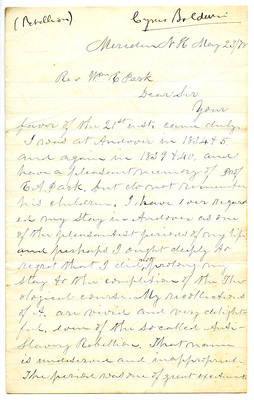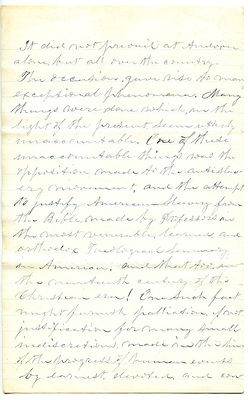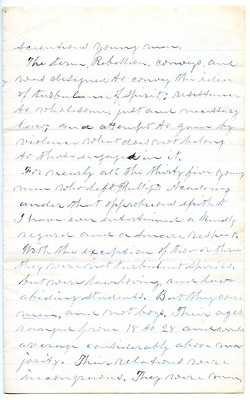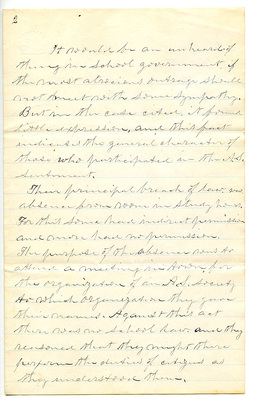Pages
BaldwinCyrus18780523_001
(Rebellion)
Cyrus Baldwin Meriden NH May 23/78
Rev Wm E Park
Dear Sir Your favor of the 21st inst. came duly I was at Andover in 1834 & 5 and again in 1839 &40, and have a pleasant memory of Prof E A Park, but do not remember his children. I have ever regard ed my Stay in Andover as one of the plesantest periods of my life and perhaps I ought deeply to regret that I did not prolong my stay to the completion of the Theological course. My recollections of A. are vivid and very delightful. One of the so called AntiSlavery Rebellion. That name is underserved and inappropiate The period was one of great excitement
BaldwinCyrus18780523_002
It did not prevail at Andover alone, but all over country. The occasions gave rise to many exceptional phenomena. Many things were done which, in the light of the present, seem utterly unaccountable. One of these unaccountable things was the opposition made As the antislavery movement, and the attempt to justify American Slavery from the Bible made by professors in the most venerable, learned, and orthodox Theological Seminary in America; and that too in the nineteenth century of the Christian era! One such fact might furnish [?iation] if not justification for many small indiscretions, made in the time of the progress of numerous events by earnest, devoted, and con
BaldwinCyrus18780523_003
screntions young men. The terms, Rebellion, conveys, and was designed to convey the idea of turbulence of spirit: resistance to wholesome, just and necessary law: an attempt to gain by violence what does not belong to those engaged in it. For nearly all the thirty five young men who left Phillips Academy under that opprobrious spirit I have ever entertained a kindly regard and a sincere respect. With the exception of two or three they were not turbulent spirits. but were law loving and law abiding students. But they were men and not boys. Their ages ranged from 18 to 28 and { } average considerably above majority. Their relations were incongruous. They were men,
BaldwinCyrus18780523_004
feeling the duties and obligations of men resting upon them: but they were under rules made for boys, who are not supposed to have assumed such responsibilities. The rules of the school forbade the formation of an Anti Slavery Society, in all disussions either written or oral, and public declarations on that subject in the school. Our young man, a professing Christian of considerable ability. Though somewhat indolent , of very excitable and prognacious conscience against all matters standing in the way of his wishes: broke over the rule, by speaking a very inflamatory and insulting piece upon the stage, in the presence of Dr Johnson. He was expelled for it and received very little sympathy from the A.S. party in school.
BaldwinCyrus18780523_005
It would be an unheard of thing in school government if the most atrocious outrages should not meet with some sympathy. But in the case cited, it found little expression, and this fact indicates the general aboration of those who participated in-the A.S. sentiment. Their principal breach of law, was absence from room in study hours. For this some had indirect permission and some have no permission. The purpose of the absence was to attend a meeting in town for the organization of an A.S. Sociey to which organization they gave their names. Against this act there was no school law, and they reasoned that they might there perform the duties of citizens as they understood them.




